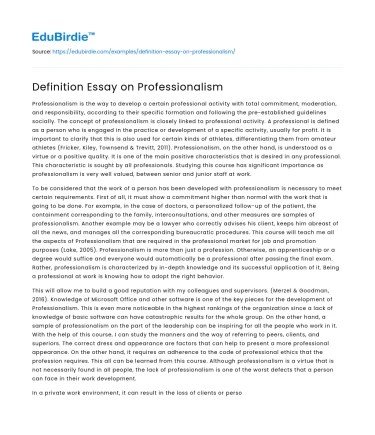Professionalism is the way to develop a certain professional activity with total commitment, moderation, and responsibility, according to their specific formation and following the pre-established guidelines socially. The concept of professionalism is closely linked to professional activity. A professional is defined as a person who is engaged in the practice or development of a specific activity, usually for profit. It is important to clarify that this is also used for certain kinds of athletes, differentiating them from amateur athletes (Fricker, Kiley, Townsend & Trevitt, 2011). Professionalism, on the other hand, is understood as a virtue or a positive quality. It is one of the main positive characteristics that is desired in any professional. This characteristic is sought by all professionals. Studying this course has significant importance as professionalism is very well valued, between senior and junior staff at work.
To be considered that the work of a person has been developed with professionalism is necessary to meet certain requirements. First of all, it must show a commitment higher than normal with the work that is going to be done. For example, in the case of doctors, a personalized follow-up of the patient, the containment corresponding to the family, interconsultations, and other measures are samples of professionalism. Another example may be a lawyer who correctly advises his client, keeps him abreast of all the news, and manages all the corresponding bureaucratic procedures. This course will teach me all the aspects of Professionalism that are required in the professional market for job and promotion purposes (Lake, 2005). Professionalism is more than just a profession. Otherwise, an apprenticeship or a degree would suffice and everyone would automatically be a professional after passing the final exam. Rather, professionalism is characterized by in-depth knowledge and its successful application of it. Being a professional at work is knowing how to adopt the right behavior.
Save your time!
We can take care of your essay
- Proper editing and formatting
- Free revision, title page, and bibliography
- Flexible prices and money-back guarantee
This will allow me to build a good reputation with my colleagues and supervisors. (Merzel & Goodman, 2016). Knowledge of Microsoft Office and other software is one of the key pieces for the development of Professionalism. This is even more noticeable in the highest rankings of the organization since a lack of knowledge of basic software can have catastrophic results for the whole group. On the other hand, a sample of professionalism on the part of the leadership can be inspiring for all the people who work in it. With the help of this course, I can study the manners and the way of referring to peers, clients, and superiors. The correct dress and appearance are factors that can help to present a more professional appearance. On the other hand, it requires an adherence to the code of professional ethics that the profession requires. This all can be learned from this course. Although professionalism is a virtue that is not necessarily found in all people, the lack of professionalism is one of the worst defects that a person can face in their work development.
In a private work environment, it can result in the loss of clients or personal frustration, but the lack of professionalism in a group or business environment can result in a disaster for the entire organization (Rimmer, 2018). Thus, this course is obligatory to be studied for every professional loving on this earth. The lack of professionalism, not using the right software, negligence, and unpunctuality, are just some of the examples of what may be signs of lack of professionalism. Professionalism can be encouraged among the young generation by introducing this course in every section.
References
- Fricker, J., Kiley, M., Townsend, G., & Trevitt, C. (2011). Professionalism: what is it, why should we have it and how can we achieve it?. Australian Dental Journal, 56(1), 92-96. doi: 10.1111/j.1834-7819.2010.01306.x
- Lake, C. (2005). Professionalism: The Creation, Promotion, and Maintenance of Professional Behavior. Advances In Anesthesia, 23, 1-14. doi: 10.1016/j.aan.2005.06.001
- Merzel, C., & Goodman, A. (2016). Becoming a Professional. Pedagogy In Health Promotion, 2(3), 154-160. doi: 10.1177/2373379916656639
- Rimmer, A. (2018). Improving professionalism will increase job satisfaction, says RCP. BMJ, k5216. doi 10.1136/bmj.k5216






 Stuck on your essay?
Stuck on your essay?

